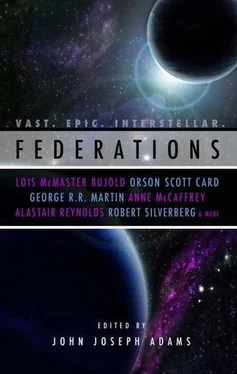“Uhh,” said the Union, “the thing is… lately I’ve been feeling… well, not feeling, but thinking… well, not thinking, but wondering…”
“Sure,” Didge said, “I can set you up.”
[If you must know the details, here’s what happened at street level. On any given block, on any given day, the Union’s citizens simply slogged through their lives—highs and lows, pleasure and pain, the ups and downs of existence. Like the individual atoms of a gas, people bounced and jostled against each other in chaotic disarray. But if you totaled up the haphazard motion, a cumulative order emerged: an overall direction of flow. Keep adding day by day, year by year, and you discovered a prevailing wind, constructed from seemingly erratic breezes.
The prevailing wind was the question, “Is this all there is?”—an anxiety that the Union was spinning its wheels. Diverse voices offered answers to the question—politicians and priests, artists and orators—but they only added wind to the gathering storm. While many individuals were perfectly content, the Union as a whole bridled restlessly.
When the clamor for “renewal” grew loud enough, members of the Union’s executive council appointed a subcommittee which spent eighteen months in hearings on A Plan for the Next Millennium . They produced a file of recommendations, one of which was to investigate the costs and benefits of contacting unknown civilizations for the purpose of “productive interaction.” Teams of scientists spent ten years constructing AI-driven sensors for determining where such civilizations might be found. After several more years of data gathering, the computers generated a list of “regions of interest” which could be reached without much new development in communications and transport.
But basically, the Union’s Zeitgeist was lonely, bored, and horny, so it turned to its version of the Internet to arrange a few blind dates.]
The initial list contained several obvious losers… such as a “technocratic utopia” inhabiting a single Dyson sphere around a red supergiant. The Union was surprised that Didge had included such a civilization. “It’s a total backwater: the people haven’t even gone interstellar!”
“But,” Didge said, “a Dyson sphere that size has more habitable land than a dozen normal star systems. Plenty of room for intellectual and physical diversity.”
“Until the central star goes nova, which could happen any second. Then the whole damned civilization will want to move in with us.”
“It’s a utopia,” said Didge. “It must have a pleasant personality.”
The Union made a scoffing sound [which is to say, the media indulged in days of derisive editorials and jokes on late-night broadcasts] . “Utopias are so self-righteous: always trying to rewrite your health-and-safety codes. No grasp of the concept of acceptable losses.”
“If you don’t like utopias,” Didge said, “you should have put that in your dating preferences.”
“It should go without saying,” the Union grumbled. “And what about that cybernetic über-web at the top of the list? You know I’m not into that assimilation stuff.”
“ Now who’s being self-righteous?” Didge asked. “There’s nothing wrong with bonding meat-life and machines into efficient cyber-organisms. You shouldn’t criticize things you’ve never even tried.”
“My parents tried it,” the Union said. “Dad was one of the great empires of his day—thousands of star systems, millions of intelligent species, a fabulous track record of conquest and pacification. Then he met Mom: a nomad fleet of a billion AIs, just arrived from the next galaxy and crazy for action. They came together like matter and antimatter: fought like mad, hooked up, then they fought like mad again… back and forth till they merged irrevocably and went through a thousand years of hell. I was born from their ashes, and my founding species swore never to let machines mess with their brains again.”
“You don’t have to tell me about your trust issues,” Didge said. “I just thought if you saw how happy a cyber-gestalt could be…”
“Forget it—I don’t want to change, I just want to get married.” The Union studied the list of newfound cultures. “What about this Bloc of Like-Minded Trading Partners? What’s wrong with her?”
“The Bloc meets your specifications exactly,” Didge replied. “Intelligent. Worldly. Affluent. Strictly biological…” Didge gave a disdainful sniff. [ She peevishly miscalculated the weather on one of the Union’s favorite planets, leading to an unexpected hurricane that killed five hundred people. ] Didge went on: “Would you like me to initiate contact?”
The Union paused for a brief month, then muttered, “Yeah, sure, okay. It’s only a date.”
• • •
Didge began an exchange of introductory transmissions—all that nonsense with prime numbers and the base spectral line of hydrogen—then the tedious accumulation of linguistic data in order to evolve translation software, and simultaneous research on ultra-long-range spacecraft that could travel all the way to Bloc territory. For its part, the Union made an effort to spruce itself up: it lowered the poverty rate by a percentage point, passed a few anti-pollution ordinances, and assassinated several insane dictators who really should have been removed earlier but who weren’t tyrannizing any important star systems and hey, if you get anal about every little atrocity, other interstellar federations stop inviting you to parties. Anyway, by the time Didge had finished designing scout-ships that could reach the Bloc, the Union felt pretty good about itself; it could bring guests home and have nothing to be ashamed of.
First contact was arranged for a barren asteroid in a star system run by one of Didge’s cyber-friends (a nano-based AI which spent most of her time processing infinite loops, for religious reasons). The meeting began with the usual stiffness—the Union’s chief delegate spent the first hour talking to the Bloc delegate’s breathing apparatus—but both sides had expected some awkwardness and they took it with good grace. Soon enough, they reached the subject of mutually beneficial trade; that broke the ice, and both relaxed as they discussed how they could profit from one another. They quickly determined several areas of technology where their interests dovetailed. In fact, by combining their expertise, they could produce a new generation of spacecraft that would make it much easier for the two federations to see each other. Both took that as a good sign.
After days of talking business, the Union finally asked the Bloc, “So what about artworks? What kind of stuff do your people make?”
The Bloc stared blankly. “Artworks?”
“Well,” said the Union, “what kind of music do you like?
The Bloc looked confused. “There seems to be a bug in our translation software. Music?”
“Pleasant sounds,” said the Union. “Auditory compositions intended to induce desired states of mind.”
The Bloc went back to staring blankly.
“Or scripted narratives,” the Union went on. “Books, movies, holo-threads, VR… any sort of fictive utterance.”
Blank.
“Come on,” said the Union, “you must tell stories.”
The Bloc looked aghast at its translation device. “Untrue accounts of people who never existed?”
The Union sighed. “So there’s no point in asking if you’d like to dance?”
• • •
Back home, the Union told Didge, “Well, there’s two decades of my life I’ll never get back.”
Didge said, “You negotiated a promising trade agreement.”
Читать дальше












